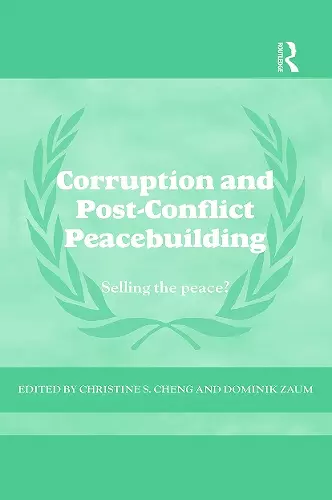Corruption and Post-Conflict Peacebuilding
Selling the Peace?
Dominik Zaum editor Christine Cheng editor
Format:Paperback
Publisher:Taylor & Francis Ltd
Published:25th Jun '13
Currently unavailable, and unfortunately no date known when it will be back
This paperback is available in another edition too:
- Hardback£150.00(9780415620482)

This edited volume explores and evaluates the roles of corruption in post-conflict peacebuilding.
The problem of corruption has become increasingly important in war to peace transitions, eroding confidence in new democratic institutions, undermining economic development, diverting scarce public resources, and reducing the delivery of vital social services. Conflict-affected countries offer an ideal environment for pervasive corruption. Their weak administrative institutions and fragile legal and judicial systems mean that they lack the capacity to effectively investigate and punish corrupt behaviour. In addition, the sudden inflow of donor aid into post-conflict countries and the desire of peacebuilding actors (including the UN, the international financial institutions, aid agencies, and non-governmental organisations) to disburse these funds quickly, create incentives and opportunities for corruption.
While corruption imposes costs and compromises on peacebuilding efforts, opportunities for exploiting public office can also be used to entice armed groups into signing peace agreements, thus stabilising post-war environments. This book explores the different functions of corruption both conceptually and through the lens of a wide range of case studies. It also examines the impact of key anti-corruption policies on peacebuilding environments. The dynamics that shape the relationship between corruption and the political and economic developments in post-conflict countries are complex. This analysis highlights that fighting corruption is only one of several important peacebuilding objectives, and that due consideration must be given to the specific social and political context in considering how a sustainable peace can be achieved.
This book will be of great interest to students of peacekeeping and peacebuilding, criminology, political economy, war and conflict studies, international security and IR.
'In this book Cheng, Zaum, and colleagues show how corruption control must be integrated within broader peacebuilding goals, and how we must adapt our choices to both history and rapidly-changing circumstances. The result is an essential guide to the challenges confronting citizens, and those who would aid them, in some of the world’s most troubled areas.' - Michael Johnston, Colgate University
'It is well known that conflict-affected states are prone to corruption, which in turn undermines faith in public institutions. What is less well known is how corruption can shape the possibilities and character of a transition to peace. By approaching it as a political rather than technical problem, this important book takes a clear-eyed look at the ways in which corruption can threaten — but also, on occasion, facilitate — post-conflict peacebuilding.' - Simon Chesterman, National University of Singapore
'This book would be a fine reference for those who seek to add some sense of reality to their practice of theory vis-à-vis conflict resolution and peacebuilding, as well as those seeking to develop practical policies on these issues' - Gibum Kim, Research Institute for Language & Information, Journal of Conflict Transformation & Security
ISBN: 9780415721561
Dimensions: unknown
Weight: 590g
320 pages